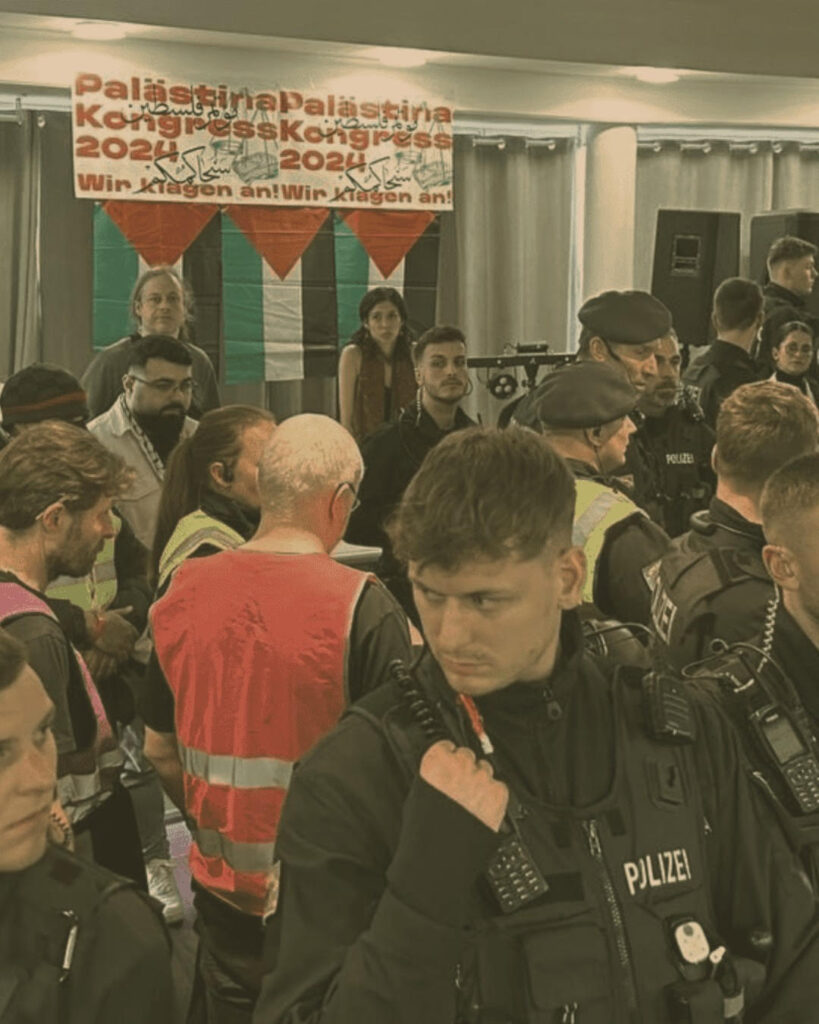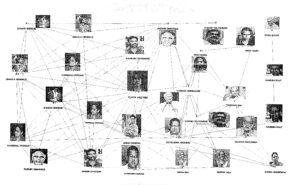
- Columns / Essay / Partnership / Quick Reads
The Raised German Finger 2.0: How Germany uses anti-Semitism accusations to muzzle Israel criticism

DiEM25 (@diem25.org), the pan-European political movement co-founded by Yanis Varoufakis, and The Polis Project, which documents global communities in resistance at the intersection of politics, art, and culture, are thrilled to announce a new collaboration.
Together, we are committed to addressing urgent political realities by building and strengthening our communities through shared knowledge and solidarity.
This partnership seeks to amplify the work of both organizations through co-publishing, joint initiatives, and engaged dialogues—fostering deeper, more inclusive conversations on contemporary politics, justice, and resistance. From empire and colonialism to systemic inequality, we aim to provide fresh, cross-border perspectives on the most pressing issues of our time.
In solidarity, we will promote diverse voices, challenge dominant narratives, and imagine alternative futures grounded in justice, care, and collective action.
The next chapter of German hypocrisy, from a personal perspective
I grew up between two worlds – the child of a Greek mother and a German father. Their cultural contrasts played out in ways both amusing and heated, from politics to everyday habits, becoming family folklore.
My mother still laughs about her first meal at my German grandparents’ house. A cold, gray spring day, a steaming Kohlsuppe on a lace-covered table in a stiff 1950s-style living room. Silence fell as everyone spooned their soup with military discipline, steam rising like factory chimneys. “So German,” she’d say, shaking her head. She adapted – softly blowing on her spoon, whispering a polite word or two.
Some time later, my father found himself in the reverse scenario. A Greek summer, cicadas screaming, the veranda of my mother’s home overlooking the sea of Patras. A long wooden table, heavy with Spanakopita, potatoes, stuffed vegetables and roasted lamb. Starving, he sat, waiting. But nobody ate. Laughter filled the air, glasses of Tsipouro clinked, hands waved in animated conversation. “Why is nobody eating?” he whispered. “They’re waiting for it to cool. And there’s just too much to talk about,” my mother grinned.
Years later, their cultural clashes played out in ideological debates. My father railed against Greek nationalism – the flags, the parades, the indoctrination of schoolchildren, the Macedonia dispute, or the Cyprus conflict. “Symptoms of nationalism gone mad,” he would say. When My Big Fat Greek Wedding came out, he saw it as a documentary rather than a comedy. “It proves my point!” he declared, and only with a faint trace of irony.
As a teenager, I found myself agreeing with him. Wasn’t Germany, with its serious self-criticism, its flag-avoidance (at least until the world cup 2006), the healthier model? Sure, my mother rolled her eyes at German obsession with discipline, punctuality, and its rigid compliance with rules. But against his idealistic pacifism, she had little ammunition. Besides, anything resembling German pride, or so-called primary virtues like punctuality, order, and obedience – the very ones he himself had been drilled with – was anathema to him, too.
My father was a young ’68er, a founding member of the Greens (when they were still pacifist), alternative, and internationalist (yet, probably as self-absorbed as they are today). He wore wool sweaters, puffed on a pipe, and loved citing Gramsci and Marx. He protested Rudi Dutschke’s assassination, and the NATO Double-Track Decision. Back then in the 1970s and 1980s, a huge number of people took to the streets of West Germany against their own government’s subservience to US foreign interests, against becoming a pawn in the game of great powers, and a potential nuclear battlefield. History repeating?
My father died 15 years ago. Even then, he shook his head at the SPD’s rightward shift, the Greens’ bourgeois turn, their Kosovo debacle. But these last years, he must be spinning in his grave: the militarism, the billions poured into rearmament (now even without the debt brake! Fancy that!), the embarrassing Zeitenwende rhetoric, the cold dismantling of the welfare state, the self-righteous Fortress Europe, raising its walls ever higher as racism and exclusion spread like wildfire.
But what would he have to say about the genocide of Gaza? My father was a professor of Hispanic culture, with a specialisation in Sephardic Jewish history. I remember a photo of him at a symposium in Jerusalem in 2005, wearing a kippah, his face solemn, heavy with historical guilt. He returned speaking of Israeli fear, how terror shaped their daily lives. That’s it.
Back then, I had no knowledge of what I can confidently call today Israel´s dehumanising settler-colonial apartheid-system. I had absorbed the German narrative: Jews as eternal, idealised victims, Palestinians as faceless, racialised perpetrators. The word Nakba didn’t reach me until many years later. Understanding it took even longer.
So, yes. After October 7, I caught myself wondering time and again: what would he say today? As a die-hard leftist, would we be locked in fierce debates about Israel’s “right to self-defense”? Would he repeat the standard German line about “historical responsibility”? Painfully, I realise, growing up means letting go of idealised parents: he would most probably have fallen for Germany’s rigid, selective, ignorant discourse that is blindly repeating Israeli propaganda. He was too weighed down by inherited guilt to see the bigger picture. After all, for his generation, rejecting their parents’ silence about the Third Reich was a defining act of identity.
It is the cruel irony of fate that those who once stood up against dehumanisation, ultimate racism, and the industrial extermination of a dehumanised people are now the ones defending a genocidal state with a moralising finger.
This article was written by Carolina Rehrmann for DiEM25. You can read the full article here.
Related Posts
The Raised German Finger 2.0: How Germany uses anti-Semitism accusations to muzzle Israel criticism

DiEM25 (@diem25.org), the pan-European political movement co-founded by Yanis Varoufakis, and The Polis Project, which documents global communities in resistance at the intersection of politics, art, and culture, are thrilled to announce a new collaboration.
Together, we are committed to addressing urgent political realities by building and strengthening our communities through shared knowledge and solidarity.
This partnership seeks to amplify the work of both organizations through co-publishing, joint initiatives, and engaged dialogues—fostering deeper, more inclusive conversations on contemporary politics, justice, and resistance. From empire and colonialism to systemic inequality, we aim to provide fresh, cross-border perspectives on the most pressing issues of our time.
In solidarity, we will promote diverse voices, challenge dominant narratives, and imagine alternative futures grounded in justice, care, and collective action.
The next chapter of German hypocrisy, from a personal perspective
I grew up between two worlds – the child of a Greek mother and a German father. Their cultural contrasts played out in ways both amusing and heated, from politics to everyday habits, becoming family folklore.
My mother still laughs about her first meal at my German grandparents’ house. A cold, gray spring day, a steaming Kohlsuppe on a lace-covered table in a stiff 1950s-style living room. Silence fell as everyone spooned their soup with military discipline, steam rising like factory chimneys. “So German,” she’d say, shaking her head. She adapted – softly blowing on her spoon, whispering a polite word or two.
Some time later, my father found himself in the reverse scenario. A Greek summer, cicadas screaming, the veranda of my mother’s home overlooking the sea of Patras. A long wooden table, heavy with Spanakopita, potatoes, stuffed vegetables and roasted lamb. Starving, he sat, waiting. But nobody ate. Laughter filled the air, glasses of Tsipouro clinked, hands waved in animated conversation. “Why is nobody eating?” he whispered. “They’re waiting for it to cool. And there’s just too much to talk about,” my mother grinned.
Years later, their cultural clashes played out in ideological debates. My father railed against Greek nationalism – the flags, the parades, the indoctrination of schoolchildren, the Macedonia dispute, or the Cyprus conflict. “Symptoms of nationalism gone mad,” he would say. When My Big Fat Greek Wedding came out, he saw it as a documentary rather than a comedy. “It proves my point!” he declared, and only with a faint trace of irony.
As a teenager, I found myself agreeing with him. Wasn’t Germany, with its serious self-criticism, its flag-avoidance (at least until the world cup 2006), the healthier model? Sure, my mother rolled her eyes at German obsession with discipline, punctuality, and its rigid compliance with rules. But against his idealistic pacifism, she had little ammunition. Besides, anything resembling German pride, or so-called primary virtues like punctuality, order, and obedience – the very ones he himself had been drilled with – was anathema to him, too.
My father was a young ’68er, a founding member of the Greens (when they were still pacifist), alternative, and internationalist (yet, probably as self-absorbed as they are today). He wore wool sweaters, puffed on a pipe, and loved citing Gramsci and Marx. He protested Rudi Dutschke’s assassination, and the NATO Double-Track Decision. Back then in the 1970s and 1980s, a huge number of people took to the streets of West Germany against their own government’s subservience to US foreign interests, against becoming a pawn in the game of great powers, and a potential nuclear battlefield. History repeating?
My father died 15 years ago. Even then, he shook his head at the SPD’s rightward shift, the Greens’ bourgeois turn, their Kosovo debacle. But these last years, he must be spinning in his grave: the militarism, the billions poured into rearmament (now even without the debt brake! Fancy that!), the embarrassing Zeitenwende rhetoric, the cold dismantling of the welfare state, the self-righteous Fortress Europe, raising its walls ever higher as racism and exclusion spread like wildfire.
But what would he have to say about the genocide of Gaza? My father was a professor of Hispanic culture, with a specialisation in Sephardic Jewish history. I remember a photo of him at a symposium in Jerusalem in 2005, wearing a kippah, his face solemn, heavy with historical guilt. He returned speaking of Israeli fear, how terror shaped their daily lives. That’s it.
Back then, I had no knowledge of what I can confidently call today Israel´s dehumanising settler-colonial apartheid-system. I had absorbed the German narrative: Jews as eternal, idealised victims, Palestinians as faceless, racialised perpetrators. The word Nakba didn’t reach me until many years later. Understanding it took even longer.
So, yes. After October 7, I caught myself wondering time and again: what would he say today? As a die-hard leftist, would we be locked in fierce debates about Israel’s “right to self-defense”? Would he repeat the standard German line about “historical responsibility”? Painfully, I realise, growing up means letting go of idealised parents: he would most probably have fallen for Germany’s rigid, selective, ignorant discourse that is blindly repeating Israeli propaganda. He was too weighed down by inherited guilt to see the bigger picture. After all, for his generation, rejecting their parents’ silence about the Third Reich was a defining act of identity.
It is the cruel irony of fate that those who once stood up against dehumanisation, ultimate racism, and the industrial extermination of a dehumanised people are now the ones defending a genocidal state with a moralising finger.
This article was written by Carolina Rehrmann for DiEM25. You can read the full article here.
SUPPORT US
We like bringing the stories that don’t get told to you. For that, we need your support. However small, we would appreciate it.








